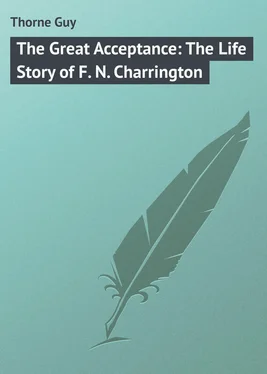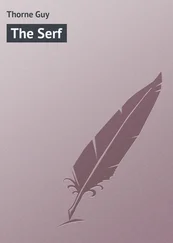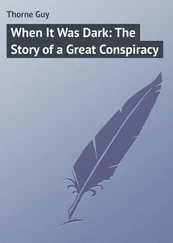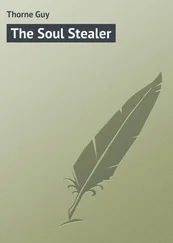Guy Thorne - The Great Acceptance - The Life Story of F. N. Charrington
Здесь есть возможность читать онлайн «Guy Thorne - The Great Acceptance - The Life Story of F. N. Charrington» — ознакомительный отрывок электронной книги совершенно бесплатно, а после прочтения отрывка купить полную версию. В некоторых случаях можно слушать аудио, скачать через торрент в формате fb2 и присутствует краткое содержание. Жанр: foreign_prose, на английском языке. Описание произведения, (предисловие) а так же отзывы посетителей доступны на портале библиотеки ЛибКат.
- Название:The Great Acceptance: The Life Story of F. N. Charrington
- Автор:
- Жанр:
- Год:неизвестен
- ISBN:нет данных
- Рейтинг книги:3 / 5. Голосов: 1
-
Избранное:Добавить в избранное
- Отзывы:
-
Ваша оценка:
- 60
- 1
- 2
- 3
- 4
- 5
The Great Acceptance: The Life Story of F. N. Charrington: краткое содержание, описание и аннотация
Предлагаем к чтению аннотацию, описание, краткое содержание или предисловие (зависит от того, что написал сам автор книги «The Great Acceptance: The Life Story of F. N. Charrington»). Если вы не нашли необходимую информацию о книге — напишите в комментариях, мы постараемся отыскать её.
The Great Acceptance: The Life Story of F. N. Charrington — читать онлайн ознакомительный отрывок
Ниже представлен текст книги, разбитый по страницам. Система сохранения места последней прочитанной страницы, позволяет с удобством читать онлайн бесплатно книгу «The Great Acceptance: The Life Story of F. N. Charrington», без необходимости каждый раз заново искать на чём Вы остановились. Поставьте закладку, и сможете в любой момент перейти на страницу, на которой закончили чтение.
Интервал:
Закладка:
To a brewery identical with the one described in almost every respect, owning hundreds of tied public-houses, producing the revenue of a prince for its proprietors, Frederick Nicholas Charrington was heir.
He was born in the Bow Road, in the East End of London, on February 4, 1850, and is now, therefore, in the sixty-second year of his life.
A dear venerable old lady (Mrs. Pratt), still retained under Mr. Charrington's roof, well remembers his mother, a deeply religious woman, driving in a pony and chaise visiting the sick and needy, and relieving them according to their several necessities, for miles round the neighbourhood of the brewery. She always took with her a cordial which was made up in her own home, and for which there was a great demand from the poor, who regarded it as an infallible remedy for all kinds of diseases.
Mrs. Pratt remembers carrying "Master Fred" in her arms when he was about two years of age, and how excited he became when she took him to see a balloon passing over what was then known as Charrington's Park, open fields by which the brewery was then surrounded, but which have long since been built over.
She also remembers Master Fred at nine years of age, taking a bundle of bank notes from his father's table in the counting-house, and throwing them into the fire. When asked by his father why he did so, he characteristically replied that "he wanted to see a blaze."
Surely the child was father to the man!
In all the great breweries of London the rule has been made, and is very generally adhered to, that the partners share and share alike, so that it must be explained that Mr. Charrington was not sole heir to the business. The revenues, however, are so enormous, that, roughly speaking, a million and a quarter pounds would have come to the boy who was born in 1850. Mr. Charrington's parents were members of the Church of England, and belonged to the Evangelical school of thought. Frederick was educated at Marlborough, but during his stay at the famous public school he was laid low by a fever, which necessitated his removal at the time. Subsequently he was entered at Brighton College, where he finished his school career. He lived the ordinary life of a boy born to great wealth, and, when school days were over, he was given the choice of proceeding to the University of Oxford or of Cambridge, whichever he preferred. A University life, however, offered no attractions to the young man's cast of mind. His first experience of the larger world of men and things was made upon the Continent. It must be remembered that, at this time, the tradition that it was necessary for every young man of position to make what was known as "the grand tour," had not yet died away. Travelling was then a most costly affair, and only possible to the rich. Sir Henry Lunn and Messrs. Cook and Sons had not, at that time, made the chief Continental cities practically suburbs of London. It was thought, and rightly thought, that a Continental tour was in itself an education, and this was the means selected to widen the young man's mind. All his subsequent life Mr. Charrington has been a great traveller, and there are few parts of the world which he has not at one time or another visited, and where he has not been welcomed. So that this first foreign excursion must have been a time of great pleasure and enlightenment.
He was accompanied by the Rev. Thomas Scott, a clergyman, and had for his companion Mr. J. H. Buxton, another wealthy young brewer, who subsequently became chairman of the London Hospital. The lads visited the Paris Exhibition of 1867, and travelled through both Switzerland and Italy.
Upon his return Frederick Charrington at once elected to learn the details of the great business which there was, at the time, every prospect of his superintending. He went to the smaller brewery of Messrs. Neville, Read & Co., who were brewers to the Queen at Windsor. There he shared rooms with a young curate, the Rev. John Stone, who, by the way, was the author of the two famous and beautiful hymns, "The Church's one Foundation," and "Weary of earth and laden with my sin."
The young man's pursuits, even at this time, were by no means those of his contemporaries. Although he had the command of large sums of money if he had wished, the pleasures of ordinary young men did not appeal to him. It is not to be understood that he was in any way a milksop. He was a good waterman upon the river, and at a time when young men of position did not indulge in cricket, football, and other field sports to anything like the same extent that they do to-day, he was yet a fearless, skilful rider. There had always been many horses in his father's stables, and from his earliest youth Mr. Charrington had been an expert equestrian. In those days a young man so fond of horses, and so good a horseman, nine cases out of ten owned horses or took great interest in betting and the affairs of the turf, while an alternative was the driving of a four-in-hand coach, generally in the company of people of both sexes, neither desirable nor worthy for them to know.
Mr. Charrington did nothing of the sort. The attractions of the gilded youth of his adolescence passed him by without any appeal, and at the end of the twelve months' experience at Windsor, he entered his father's great brewery in the Mile End Road.
A rather interesting little episode in connection with Mr. Charrington's horsemanship might be mentioned here. One day, during his time at Windsor, he was riding a very spirited chestnut in a quiet and narrow lane in the environs of the town. Suddenly a groom upon horseback turned the corner, galloped up to him, and with a rude and overbearing manner ordered him to turn round and go away. Extremely surprised at the man's insolence, Mr. Charrington refused to do anything of the sort, and it seemed that almost a scrimmage was imminent.
The man then explained that the Queen was coming, and Mr. Charrington asked him why on earth he had not said so before. It was now too late. A carriage and pair, with outriders, came down the road in the opposite direction, and Queen Victoria was seated within.
Mr. Charrington realised at once what was happening, although the man had given no reasons, and he backed his horse as well as he could into the hedge. The lane was very narrow, and there was hardly room for the carriage to pass. Mr. Charrington made his horse rear upon its hind legs and took off his hat as he did so. It was only by the display of the most magnificent horsemanship that he was able to keep his seat, and allow the chaise to pass, and her Majesty smiled and bowed very graciously as she went by.
Soon after this he accompanied his parents upon another Continental tour. Upon this occasion he met with Mr. William Rainsford, son of the Rev. Marcus Rainsford, of Belgrave Chapel. The two young men returned to England together, and Charrington invited his friend to stay with him at his father's house.
It was during this visit that Mr. Rainsford spoke to his friend about his soul, and plainly asked him if he knew whether he was saved.
The question struck Mr. Charrington as singularly unpleasant. It startled him, and seemed also in bad taste. He had lived a moral and decent life in every way, and, moreover, a definitely religious life. Such a point-blank question appeared unnecessary, and he protested against such a subject of discussion, referring to the pleasant time spent upon the Continent, and hinting that a reminiscent talk of their adventures would be far more à-propos at the moment. Mr. Rainsford, however, pressed the question home, and would not be denied. Eventually he made his friend promise that the next time he was alone he would read the third chapter of the Gospel of St. John. The promise was kept, though the reader expected no new spiritual experience whatever.
As he opened the Bible an incident of the past struck him, and before reading he paused to recall it.
Читать дальшеИнтервал:
Закладка:
Похожие книги на «The Great Acceptance: The Life Story of F. N. Charrington»
Представляем Вашему вниманию похожие книги на «The Great Acceptance: The Life Story of F. N. Charrington» списком для выбора. Мы отобрали схожую по названию и смыслу литературу в надежде предоставить читателям больше вариантов отыскать новые, интересные, ещё непрочитанные произведения.
Обсуждение, отзывы о книге «The Great Acceptance: The Life Story of F. N. Charrington» и просто собственные мнения читателей. Оставьте ваши комментарии, напишите, что Вы думаете о произведении, его смысле или главных героях. Укажите что конкретно понравилось, а что нет, и почему Вы так считаете.












